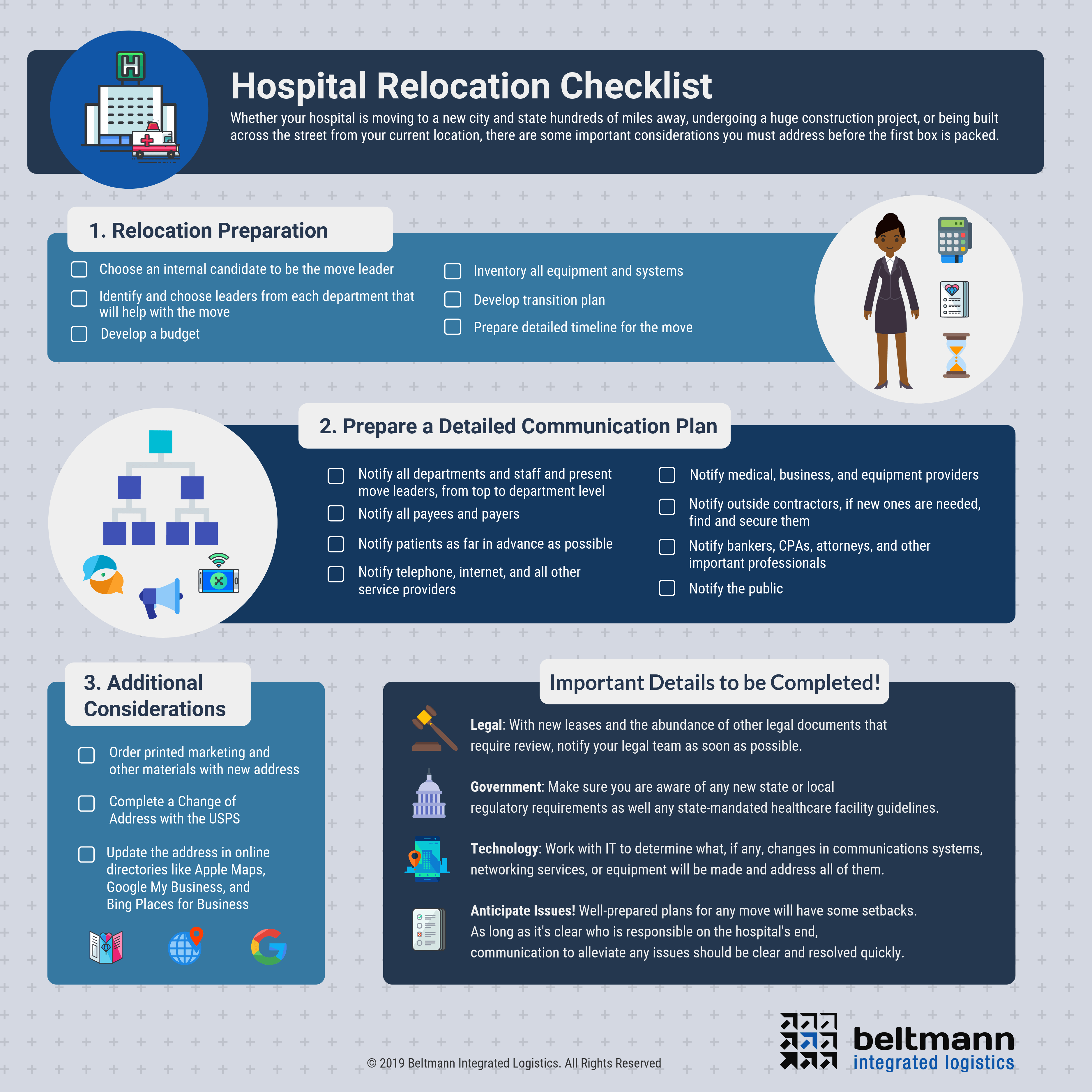
Hospital Relocation Checklist - Your Hospital Relocation Plan

In the healthcare industry, good hospital administrators and leaders are knowledgeable, responsible, and efficient in managing the day to day operations of their respective departments. Those same leaders are counted on when it comes to ensuring a smooth transition during a hospital relocation. Obviously, these are two very different skill sets, but with some smart organization and planning, any move can be a success.
Moving, whether it involves you and your family, or your business or hospital, is something that should be as stress-free as possible. It's an exciting time, and it's important to let your staff know that it's a positive change, with new offices, equipment, and a location that was chosen to optimize staff efficiency and quality.
Whether your hospital is moving to a new city and state hundreds of miles away, undergoing a huge construction project, or being built across the street from your current location, there are some important considerations you must address before the first box is packed. The best way to begin is with a well-prepared hospital relocation plan that is communicated and closely followed by all staff members. We've put together some tips and a hospital relocation checklist that will serve you well as you plan any hospital move.
Start your hospital relocation plan with a healthcare facility transition plan. This will cover a wide range of strategic and operational tasks, from before the move to post moving day.
Healthcare Facility Transition Planning
Good hospital transition planning should include:
- A detailed schedule and task checklist for everything before the move
- New building intro to staff, office chart and dates for pre-move orientation
- A schedule/detailed plan for moving patients
- A schedule/detailed plan for moving equipment
- A detailed post-move schedule and checklist
The transition planning needs to get started months before your scheduled move in date. This will ensure that nothing is missed and the move is a success.
Hospital Relocation Checklist
Let's move on to a detailed hospital relocation checklist.

A Thorough Hospital Relocation Checklist Includes:
- Choose an internal candidate to be the move leader
- Identify and choose leaders from each department that will help with move
- Develop move budget
- Inventory all equipment and systems
- Develop transition plan
- Prepare detailed timeline for the move
Prepare a detailed communication plan:
- Notify all departments and staff and present move leaders, from top to department level
- Notify all payees and payers
- Notify patients as far in advance as possible
- Notify telephone and internet service providers, all other service providers
- Notify medical and business suppliers and equipment providers
- Notify outside contractors, if new ones are needed, find and secure them
- Notify your bankers, CPAs, attorneys and other important professionals
- Notify the public
More:
- Order printed marketing and other materials with new address
- Complete a Change of Address with the USPS
- Update the address in online directories like Apples Maps, Google My Business, and Bing Places for Business
There are many details within this checklist that need to be completed. Some of the most important ones include:
- Legal: With new leases and the abundance of other legal documents that require review, notify your legal team as soon as possible.
- Government: Make sure you are aware of any new state or local regulatory requirements as well any state-mandated healthcare facility guidelines.
- Technology: Work with IT to determine what, if any, changes in communications systems, networking services, or equipment will be made and address all of them.
- Anticipate Issues! Well-prepared plans for any move will have some setbacks. As long as it's clear who is responsible on the hospital's end, communication to alleviate any issues should be clear and resolved quickly.
Taking Stock of Equipment and Inventory – What Do You Need to Move?
Some of the more difficult parts of a move, especially a hospital move, is t he amount of inventory that needs to be transferred to the new hospital location. Take this move as an opportunity to get rid of any hard to move or outdated inventory that hasn't been cost-effective. Consider buying new equipment and have it sent to the new location, as opposed to moving the old equipment. Although this isn't feasible in every case, especially when dealing with extremely critical medical equipment, it's a good time to figure out what you need to move and upgrade to newer and better inventory when possible.
he amount of inventory that needs to be transferred to the new hospital location. Take this move as an opportunity to get rid of any hard to move or outdated inventory that hasn't been cost-effective. Consider buying new equipment and have it sent to the new location, as opposed to moving the old equipment. Although this isn't feasible in every case, especially when dealing with extremely critical medical equipment, it's a good time to figure out what you need to move and upgrade to newer and better inventory when possible.
Don't Get Caught with Downtime
It's important to stay on schedule for any move, and a hospital move, with patients and many different departments and staff members involved, is especially difficult unless a detailed schedule is strictly followed.
Hire the Right Partner
If you are planning on making a hospital move, make sure that you have the right partner to help with the logistics of your hospital relocation. The process of selecting a relocation partner will play a key role in the success of the move. Be sure the hospital relocation partner is organized, experienced, and has plenty of healthcare relocation references.
Hospital Relocations with Beltmann Integrated Logistics
At Beltmann, we have teams of experienced professionals that are qualified to help manage your healthcare relocation project from start to finish. We understand the importance of keeping the critical components of any healthcare facility going, and we'll make sure the move is as efficient and smooth as possible for you, your staff, and your patients. Patient care, safety and comfort is at the forefront of any hospital move we undertake!
Here are some of the services we provide:
- Inventory Management
- Project Planning
- Transportation
- Assembly and Disassembly of Items
- Storage
Our team of dedicated logistic professionals are ready to help with any hospital move. Contact us today for more information on how we can best serve your healthcare facility relocation project!






